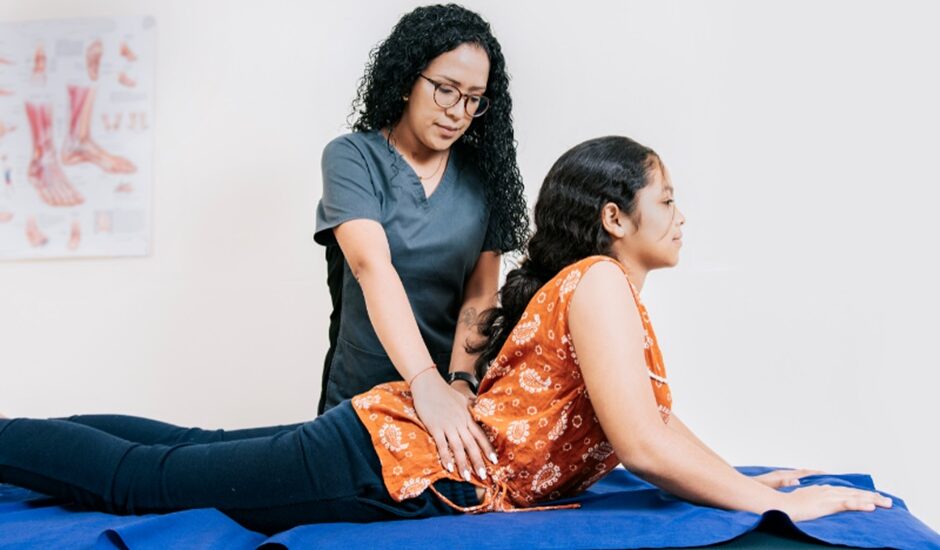The lumbar spine constitutes the lower back, supporting a significant portion of the body’s weight while facilitating ample movement. Due to its vital role, it is also susceptible to injury and strain, resulting in common conditions such as lower back pain, herniated discs, and degenerative spine diseases.
One practical approach for addressing lumbar spine concerns is home physiotherapy, and in Singapore, this has become a favoured option.
Examine the primary concerns related to the lumbar spine and learn how home physiotherapy in Singapore can assist in recovery and alleviate pain.
Common Lumbar Spine Issues
Lower Back Pain
Lower back pain is one of the typical complaints among individuals, particularly those with sedentary lifestyles or physically demanding jobs. The lumbar spine’s structure is complex, consisting of muscles, ligaments, nerves, and bones. Strain or injury to any of these components can lead to pain, making it difficult to perform daily activities.
Herniated Disc
A herniated disc occurs when the soft inner material of a spinal disc pushes out through the tougher exterior. This concern can irritate nearby nerves and cause pain, numbness, or weakness in the legs. Herniated discs often occur in the lumbar region, where the spine endures stress during lifting, twisting, and bending.
Degenerative Disc Disease
As individuals age, the discs in the spine lose their elasticity, hydration, and height. This instance leads to degenerative disc disease, a condition that can cause chronic pain, stiffness, and limited mobility. Over time, the condition can also lead to spine osteoarthritis, resulting in severe discomfort.
Sciatica
Sciatica is a condition where the sciatic nerve, which runs from the lower back through the hips and down each leg, becomes compressed or irritated. It is often caused by a herniated disc or bone spur pressing on the nerve. Sciatica can lead to shooting pain, numbness, and weakness in the affected leg.
How Home Physiotherapy Can Help
Home-based physiotherapy has become a practical approach to managing lumbar spine conditions. It allows patients to receive personalised care comfortably, focusing on exercises and treatments specifically designed to address lumbar spine issues.
Tailored Exercise Programs
Physiotherapists assess the patient’s condition and create individualised exercise programs. These exercises focus on strengthening the muscles surrounding the lumbar spine, enhancing flexibility, and promoting proper posture. Regular physiotherapy exercises help reduce pain, restore function, and prevent future injuries.
Pain Management Techniques
Home physiotherapy includes various pain management techniques that can be applied during sessions. These techniques may incorporate manual therapy, massage, and stretching exercises aimed at relieving pressure on the spine and reducing inflammation. The physiotherapist might also employ electrotherapy methods, such as transcutaneous electrical nerve stimulation (TENS), to manage pain.

Posture Correction
One of the primary elements of lumbar spine physiotherapy is posture correction. Poor posture can place undue stress on the lumbar spine, exacerbating pain and discomfort. A home physio will work with patients to enhance their sitting, standing, and lifting techniques, ensuring the spine is properly aligned during everyday activities.
Strengthening Core Muscles
Weak core muscles are often a contributing factor to lumbar spine pain. Strengthening the core helps stabilise the spine and provides proper support to the lower back. Home physiotherapy incorporates exercises targeting the abdominal, pelvic, and lower back muscles to enhance stability and reduce the risk of further injury.
Education on Ergonomics
Home physiotherapy also involves education on ergonomics, helping patients make adjustments in their living and working environments to avoid unnecessary strain on the lumbar spine. Physiotherapists may advise on the proper use of chairs, desks, and lifting techniques, particularly for individuals with physically demanding jobs.
Benefits of Home-Based Physiotherapy for Lumbar Spine Conditions
Receiving treatment at home offers several advantages for those dealing with lumbar spine conditions. Here are some of the main benefits of choosing home physiotherapy:
Convenience
Home physiotherapy eliminates the need to travel to a clinic, which can be challenging for those with mobility issues or severe pain. Patients can receive the same quality of care without the added strain of commuting, making it easier to stay consistent with their treatment plan.
Personalised Care
Home physio in Singapore allows the physiotherapist to assess the patient’s home environment and make recommendations for exercises and activities that fit within their daily routine. This personalised approach can enhance the treatment’s efficacy and help patients recover quickly.
Faster Recovery
By receiving one-on-one attention in a familiar setting, patients are likely to follow through with their physiotherapy exercises and recommendations. This adherence to the treatment plan can lead to faster recovery times compared to traditional clinic-based physiotherapy.
Reduced Risk of Complications
For individuals recovering from lumbar spine surgery or injury, home-based physiotherapy reduces the risk of complications, such as infections or further injury, that may occur during travel or in unfamiliar settings. It also ensures that patients receive immediate attention in case of unexpected issues during rehabilitation.
Conclusion
Addressing lumbar spine concerns through physio spine represents a viable and efficient strategy. Conditions like lower back pain, herniated discs, and sciatica can greatly affect a person’s quality of life. However, with focused treatments and customised care plans, patients can conveniently alleviate pain, restore mobility, and enhance their overall spinal health.
Contact The Home Physio to take control of your lumbar spine health today!





